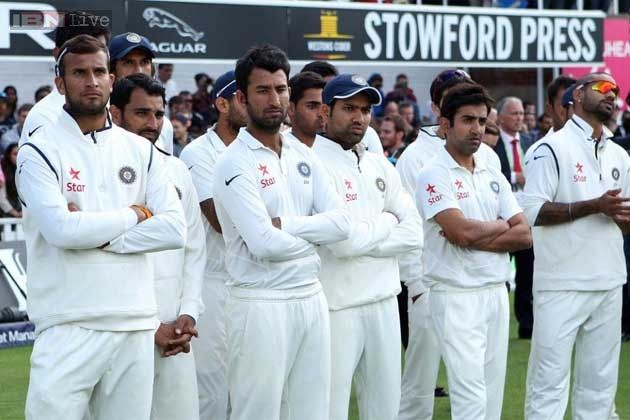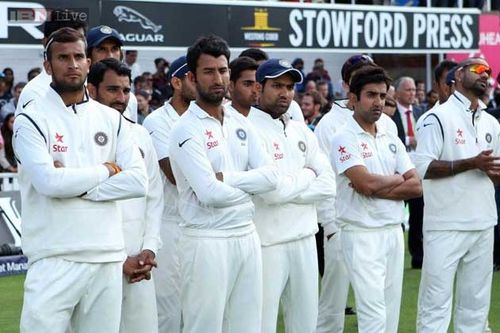
Game of Cricket: Where Change is the only constant

“Jordan to Ishant. It’s fended up in the air, Moeen Ali completes the catch, and England complete proceedings. England beat India 3-1 after being 0-1 down in the series. Amazing scenes here at the Oval.”
Not so amazing if you are an Indian supporter. But familiar, yes. The last three Tests have provided unheralded sadness to the Indian fans, and even the most optimistic ones are beginning to lose hope. But history, with all its experience, has another story to tell.
Humiliation is defined as “make (someone) feel ashamed and foolish by injuring their dignity and pride.” Sadly, this word is used more often than it should whilst speaking about losses by a huge margin, along with words like ‘raped’ . Is cricket really a matter of life and death?
For some, it is, and there is not much wrong in it. When our beloved team ends up on the losing side, we are bound to feel dejected and hurt. It is the way our brain works; we are indeed helpless. One feels agonized when someone they look up to brings nothing but sorrow. Is it the end of the world, though? Can one simply stop believing?
Rewind to Lord’s
Let us rewind a few days to the second Test at Lord’s. India were on their highest point in recent history, after completing what was only their 7th Test win in England in a span of over 80 years, and their first meaningful victory abroad since 2011. MS Dhoni, who had received immense flak until then, was hailed as a master tactician for persuading Ishant Sharma to bowl bouncers. The same Ishant who was the butt of all jokes up to that point took 7/74 . The Indian batting line up was hailed to be in it for the long haul.
On the other hand, England were below ground zero, the lowest they had been in a long, long time. Alastair Cook, who had received more flak than most could bear to take, stood firm by his decision to stay as captain, but the results were just not showing. The matters had aggravated when they lost their first series on home soil against Sri Lanka following their 5-0 humbling Down Under. Cook averaged below 30 since the start of 2013, and even calls for axing him from the team were starting to take shape. The same Cook who made life difficult for Australia in the 2010-11 series, scoring 766 runs in 5 matches. The same Cook who was touted to be the man to break Sachin Tendulkar’s record of most hundreds in Test cricket.
But then the change began. Why, you ask? Because they believed in themselves. They simply did not give up.
Fortunes change
Barely a month later, the same Cook, who was earlier tagged as defiant, is hailed to be a man with a large heart, a player who could stand in tough situations and not give up. The runs that eluded him for so long are finding their way back to his bat. Micheal Vaughan apologised for what he had said about him, and Paul Downton praised how he did not give up after being on the verge of doing so. A very nice touch of irony is that the same people heaping praise on Cook are those who want Dhoni to resign, thereby proving that on one side they believe being as resilient as Cook was the correct way forward, but Dhoni not resigning is not resilient but stubborn.
Whether Dhoni should resign or not is a matter of endless debate, and I honestly do not know what the right choice is; that’s not the point I wish to make. However, when Mike Brearly, one of the greatest captains of all time says Dhoni is not that good, you have no choice but to stand up and take notice. That being said, fortunes change in a matter of matches, days, sessions, or, even, seconds; ask Cook, who was dropped by Ravindra Jadeja, possibly the turning point of the series. Struggling up to that point, he resurrected not only his career as a batsman but also as captain after that drop. Ask Virat Kohli and Cheteshwar Pujara, who were the cynosure of all eyes before the beginning of the tour, but now are looked upon with disappointment. Before you know it, things begin to change.
Tales from the past
Cook’s story adds another feather in the cap of the stories history wishes to tell. A story which beholds that it is darkest before dawn. But the darkness invariably gives way to sunlight. May it be the ‘Botham’s ashes’ when Sir Ian Botham, after being stripped off captaincy mid series, took it upon himself to complete a historic series victory or the Indian win in 2000-2001 series against Australia after being 0-1 down and forced to follow on, or the Australian comeback last year. Not having won a single Test match in India and England, they not only whitewashed England 5-0 in the reverse but also went on to defeat world-beaters South Africa in their own backyard, their victory inspired by an even more convincing comeback story of Mitchell Johnson. The list is endless.
Maybe history, by telling such stories, wants us to ask ourselves this question: Do we jump to conclusions too early? Do we make general rules out of isolated incidents?
If we do, is it correct to do so? It is surprising the way opinions change after just a few wins or losses. I thoroughly believe last three losses are impossible to digest, especially because we have scored 178, 152, 161, 148 and 94 in our last 5 innings. It is far from acceptable. Yes, Dhoni’s tactics were erratic. But is this the end of an era? Is this the end of Indian cricket?
One should remember that over the years, critics have been silenced, fans have been given a new hope, and media another legendary story to write about. When a team or great player is down and out, more often than not, destiny is busy on its typewriter, typing away a comeback story. Change happens all the time, and may happen with you when you least expect it. What is most important is to hope, to believe in a better future, because let’s face it: when you love a team with all your heart, somewhere amidst all that criticism, there is a desire to be back to winning ways, a desire that keeps us going.